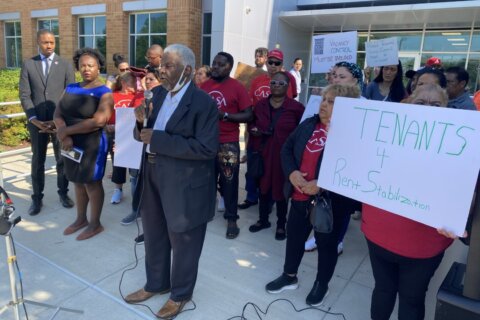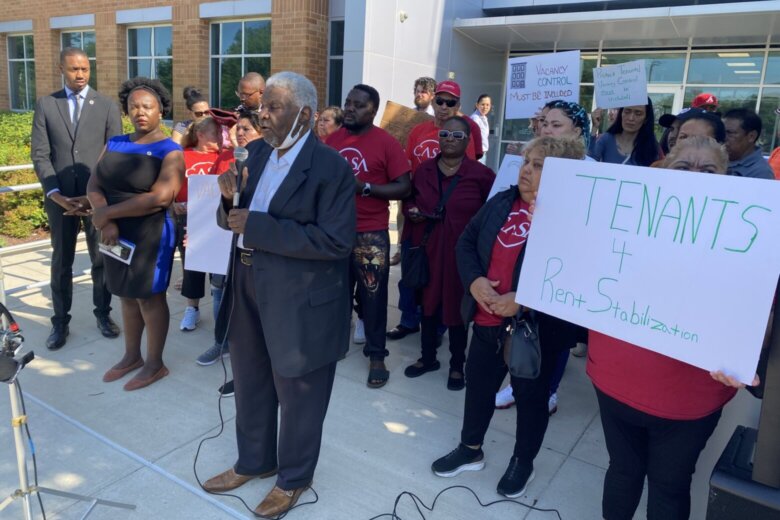
The Prince George’s County Council in Maryland has introduced a bill that would permanently impose rent caps — or rent stabilization as the council calls it.
The bill, introduced by Council Chair Jolene Ivey and backed by five other council members, was quickly panned by progressive groups that rallied outside council chambers, and by progressive members, who criticized Ivey as the bill was introduced.
The bill would cap rent hikes at 3% plus the rate of inflation, with a 6% hard cap. Under the bill, it’s possible that landlords who don’t raise rents with the cost of inflation could bank that increase for subsequent years — essentially allowing them to increase rent by as much as 10% on a one-time basis following several years of lower or no rent hikes.
The caps also wouldn’t be applied to any rental properties that were finished in this century. Progressive advocates want to be able to roll that 24-year exemption over in the future. For instance, next year it would only apply to properties finished after 2001, and in 2030, to properties that were finished in 2006. The law mirrors much of what is already done in Montgomery County.
“We’re trying to be responsible and responsive” and look out for people, Ivey said, adding that during the pandemic, there were landlords who “radically increased” rent, which she said wasn’t fair to anyone. Ivey said that’s what the 3% cap was addressing in the first place.
She said rent stabilization is necessary with the changing times.
“This is the rate in the region that is viewed as something that landlords can live with, and that the renters can live with, as well,” Ivey said.
The current proposal is also on the low end of a rate suggestion made by a task force led by Council member Krystal Oriadha, but she said it exposes too many seniors to rent hikes bigger than what they can afford. She said it also leaves open a loophole that makes the new law easy to work around.
“Seniors are impacted at a higher rate, and they’re on a fixed income,” said Oriadha, who wants senior housing capped at 4% hikes. “Lower increases still impact them and have a larger impact.”
She also said the bill does nothing to stop landlords from evicting someone for any reason and then hiking the rent beyond the current caps.
“An unintended consequence is seeing so many people being evicted just so they could jack up the prices,” Oriadha said. “So there’s so many things that weren’t taken into account in this legislation that don’t go far enough.”
Ivey disagreed with the notion that would be allowed, and said the more progressive members of the council would “just rather raise a ruckus.”
And that’s what happened when the bill was formally introduced to the council, as Oriadha accused Ivey and others of not acting in good faith and drafting the bill in secret.
“My major concern is … there’s a level of transparency and honesty and integrity that I hope we could all treat each other with,” said Oriadha, who called the bill centered on appeasing the housing industry and not residents.
From there, Council member Wala Blegay chimed in with even stronger words against Ivey and others on the council. She explicitly criticized the decision to leave Oriadha out of the process after she had chaired a work group on the subject last year.
“Now we have a version sitting here before us … and she’s not a part of it. I wasn’t a part of it,” Blegay added before Ivey shut down the conversation.
“I will say this is part of the legislative process. Everyone here will have the opportunity to weigh in on the bill as always,” Ivey said. “You’ve been on the council a year and a half now, I think you know the legislative process.”
Oriadha took umbrage to that, saying to Ivey, “Please don’t insult our intelligence,” as Ivey banged the gavel and some in the gallery started jeering.
Discussion on the topic ended with Council member Wanika Fisher asking for better decorum from her colleagues and from the audience. She added that chippiness this early in the process was counterproductive.
“I don’t like all the arguing back and forth between colleagues,” Fisher said. “I don’t think it’s good. We need to follow the rules. Please, let’s do that.”
Get breaking news and daily headlines delivered to your email inbox by signing up here.
© 2024 WTOP. All Rights Reserved. This website is not intended for users located within the European Economic Area.









